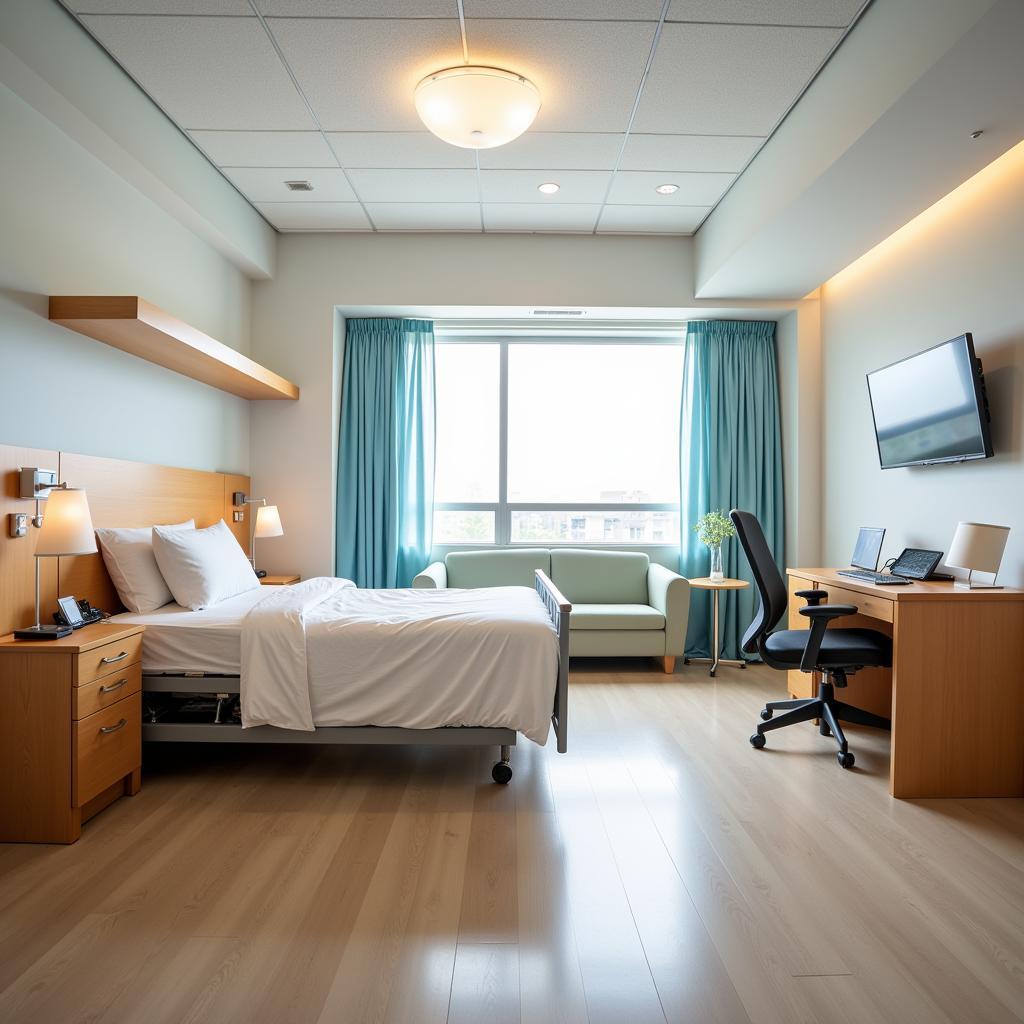When a loved one requires an extended hospital stay, comfort and convenience become paramount. Balancing the needs of the patient and the support person can be a challenge, especially when it comes to overnight stays. That’s where a Hospital Sleeper Couch emerges as an invaluable asset, offering a comfortable and practical solution for overnight accommodations. This comprehensive guide delves into the world of hospital sleeper couches, exploring their features, benefits, and factors to consider when choosing the right one.
Understanding the Importance of a Comfortable Hospital Stay
 Comfortable hospital room with a sleeper couch
Comfortable hospital room with a sleeper couch
The hospital environment can be stressful and emotionally draining for both patients and their families. A comfortable and supportive environment contributes significantly to the healing process and overall well-being. While hospital beds cater to patients, a sleeper couch provides a dedicated space for loved ones to rest and recharge, ensuring they can provide optimal support without compromising their own comfort.
The Versatility of a Hospital Sleeper Couch
Hospital sleeper couches are renowned for their versatility and ability to adapt to various needs. By day, they serve as comfortable seating for visitors, offering a welcoming space for conversation and companionship. As night falls, they effortlessly convert into supportive beds, ensuring a restful sleep for overnight guests. This dual functionality optimizes space utilization within the hospital room, a crucial factor in often compact environments.
Key Features to Consider in a Hospital Sleeper Couch
When selecting a hospital sleeper couch, several factors warrant careful consideration to ensure optimal comfort, functionality, and durability.
1. Size and Dimensions
Hospital rooms come in various sizes, so it’s essential to choose a sleeper couch that fits comfortably within the available space without obstructing walkways or essential equipment access. Consider the dimensions of both the couch and bed configurations to guarantee ample space for movement and comfort.
2. Mattress Quality and Support
The primary purpose of a sleeper couch is to provide a comfortable sleeping surface. Opt for a couch with a high-quality mattress that offers adequate support and pressure relief. Memory foam and innerspring mattresses are popular choices for their comfort and durability.
3. Ease of Conversion
Hospital settings demand user-friendly furniture, especially for individuals unfamiliar with complex mechanisms. Choose a sleeper couch with a smooth and intuitive conversion system that requires minimal effort to transform from a couch to a bed and vice versa.
4. Durability and Cleanability
Hospital furniture endures frequent use and must meet stringent hygiene standards. Look for sleeper couches constructed from durable, easy-to-clean materials that can withstand regular cleaning and sanitization without compromising their appearance or functionality.
The Benefits of a Hospital Sleeper Couch for Patients and Families
The presence of a sleeper couch in a hospital room offers numerous benefits for both patients and their families, contributing to a more positive and supportive environment.
Enhanced Patient Comfort and Well-being
Knowing that loved ones are nearby and well-rested provides invaluable emotional support and comfort to patients, potentially aiding in their recovery process. The ability to spend quality time with family and friends without the constraints of limited visiting hours can significantly boost morale and reduce feelings of loneliness or isolation.
Reduced Stress and Fatigue for Family Members
Having a dedicated and comfortable space to rest within the hospital room allows family members to conserve energy and manage stress levels effectively. This is particularly crucial during prolonged hospitalizations, where fatigue can hinder their ability to provide optimal support.
Improved Communication and Bonding
The presence of a comfortable seating area encourages open communication and interaction between patients, families, and healthcare providers. This informal setting can facilitate discussions about treatment plans, concerns, and emotional well-being, fostering a more collaborative and supportive environment.
Choosing the Right Hospital Sleeper Couch: Factors to Consider
Selecting the ideal hospital sleeper couch requires careful consideration of specific requirements and preferences.
Budgetary Constraints
Hospital sleeper couches are available at various price points, influenced by factors such as size, material quality, and additional features. Determine a realistic budget range to narrow down the options and focus on couches that offer the best value for the investment.
Specific Patient Needs
Consider any specific needs or limitations the patient may have. For instance, patients with mobility issues may benefit from a couch with adjustable features or a lower height for easier access.
Hospital Regulations and Guidelines
Hospitals may have specific regulations regarding furniture size, material, or fire safety standards. Check with the hospital administration to ensure compliance with their guidelines before making a purchase.
Conclusion: Investing in Comfort and Support
A hospital stay, though temporary, can significantly impact patients and their families. By providing a comfortable and functional space for rest and respite, a hospital sleeper couch becomes an invaluable investment in their well-being. When choosing a sleeper couch, prioritize comfort, durability, and ease of use, ensuring it meets the unique needs of both the patient and their support system. Remember, a little comfort can go a long way in promoting healing and fostering a positive hospital experience for everyone involved.